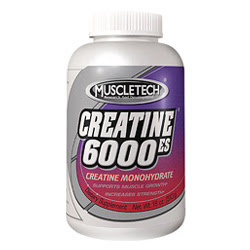ABC News Vilifies Creatine
by Chris Shugart
The media is at it, again, doing their best to vilify the dietary-supplement industry and eventually force stricter and stricter government regulation. They won't be happy until all that's left on the shelves is Flintstones Complete.
This time, the evil culprit is creatine.
ABC just did a piece on 13 high school football players who were admitted to the hospital for compartment syndrome, a condition where swelling muscles are compressed by the fascia, begin to deteriorate, and emit toxins into the blood.
"Doctors are investigating whether muscle-building supplements like creatine, common among high school athletes, helped lead to this," the report stated. It ended with a warning to parents about the "possible dangers" of unregulated supplements. "Compartment syndrome is often linked to creatine," the accompanying text on the ABC News website said.
Ah, you can just hear the lamentations of the uninformed now, can't you?
"Creatine is a dangerous, steroid-like supplement! Remember when it killed those three wrestlers back in '97?"
The real story? The wrestlers were trying to drop weight, as much 12 pounds in a single day. They were on creatine, but they also wrapped themselves in trash bags or wore rubber suits and exercised until collapsing... in saunas... while restricting fluid intake... and taking diuretics. Their deaths were tragic, but not surprising given those circumstances.
The final ruling by the FDA? Creatine was not a factor in these deaths.
The newspapers, including the New York Times, retracted their alarmist stories, but the damage had been done. Creatine was, forever after, "dangerous" in the minds of the lay public and the media. As Winston Churchill once said, a lie gets halfway around the world before the truth has a chance to get its pants on.
And now it's happening again. And once again, they have the facts dead wrong.
The Facts
1. First off, according to ABC's own story, "...the players who were stricken with the symptoms said they hadn't taken any supplements." That didn't stop ABC from making the allegation and showing the same stock footage of creatine it used in 1997. One newspaper report did ominously say that some of the athletes "admitted" to drinking protein shakes. (Luckily, no one's kidneys imploded.)
2. The players, under the direction of new coach, Jeff Kearin, were involved in "immersion camp" — a period of intense practice where athletes stay overnight at the school. Some of the training involved exercising in a 115 degree wrestling room. (Sound familiar?) Water bottles were not made readily available, but athletes reportedly "had access" to water.
3. Creatine isn't "often linked" with compartment syndrome. Here's the full story: There were a couple of papers published years ago by a researcher named Pottinger that made the association. These papers were criticized due to methodological concerns, and Pottingger ended up leaving the university, reportedly due to these worries.
However, The American College of Sports Medicine (ACSM) picked up on these questionable studies and made them part of their recommendations.
Follow-up papers out of UCONN found:
"A high dose of CrM supplementation during exercise periods of increased thermal stress showed a mild to moderate trend toward increased ACP measures in dehydrated males. However, our results do not support the American College of Sports Medicine's recommendation, because no associated symptoms of anterior compartment syndrome were seen. The differences were minimal, and the increased pressures readily equalized after intermittent exercise."
In other words, one guy thought creatine might have something to do with compartment syndrome. He was wrong and this turned out not to be the case according to follow-up papers. But like the wrestlers who "died of creatine" the misinformation was released and word spread.
Richard Kreider, PhD, who has researched creatine since 1993, comments:
"Isn't it interesting how people always speculate that a supplement is the problem when they miss the obvious: overtraining in hot and humid environments? Train kids in a 115 degree room so they dehydrate during an 'immersion camp' where they no doubt were training excessively (raising CK levels) all day long for several days leading to more dehydration, and the problem is creatine?
"Many studies have been done (since the early 1990's) that show creatine does not cause dehydration. If anything, creatine promotes hyperhydration — whole body fluid retention — leading to less thermogregulatory stress during intense exercise in the heat.
"It would be nice if coaches (and the media) didn't blame their poor and potentially dangerous coaching and training methods on a supplement like creatine that research has own to be safe and effective in a number of populations for years."
Final Thoughts
Creatine has been used extensively by athletes since the early 1990's and Olympic athletes since the 1960's. After years of being studied (creatine is in fact the most studied sports supplement in history), are we to believe that it suddenly has an adverse side effect, and that this side effect mysteriously manifested at the same time in 13 high school footballers who happened to be practicing together?
The superintendent of the school, Maryalice Russell, said she didn't believe the problems were caused by the type of workouts the players were doing during the immersion camp. Of course she didn't. That might lead to accusations of staff incompetence. There could be lawsuits.
Better to point the finger at a supplement, even if it has never been shown to cause this effect, even if the players say they weren't even taking it.


No comments:
Post a Comment